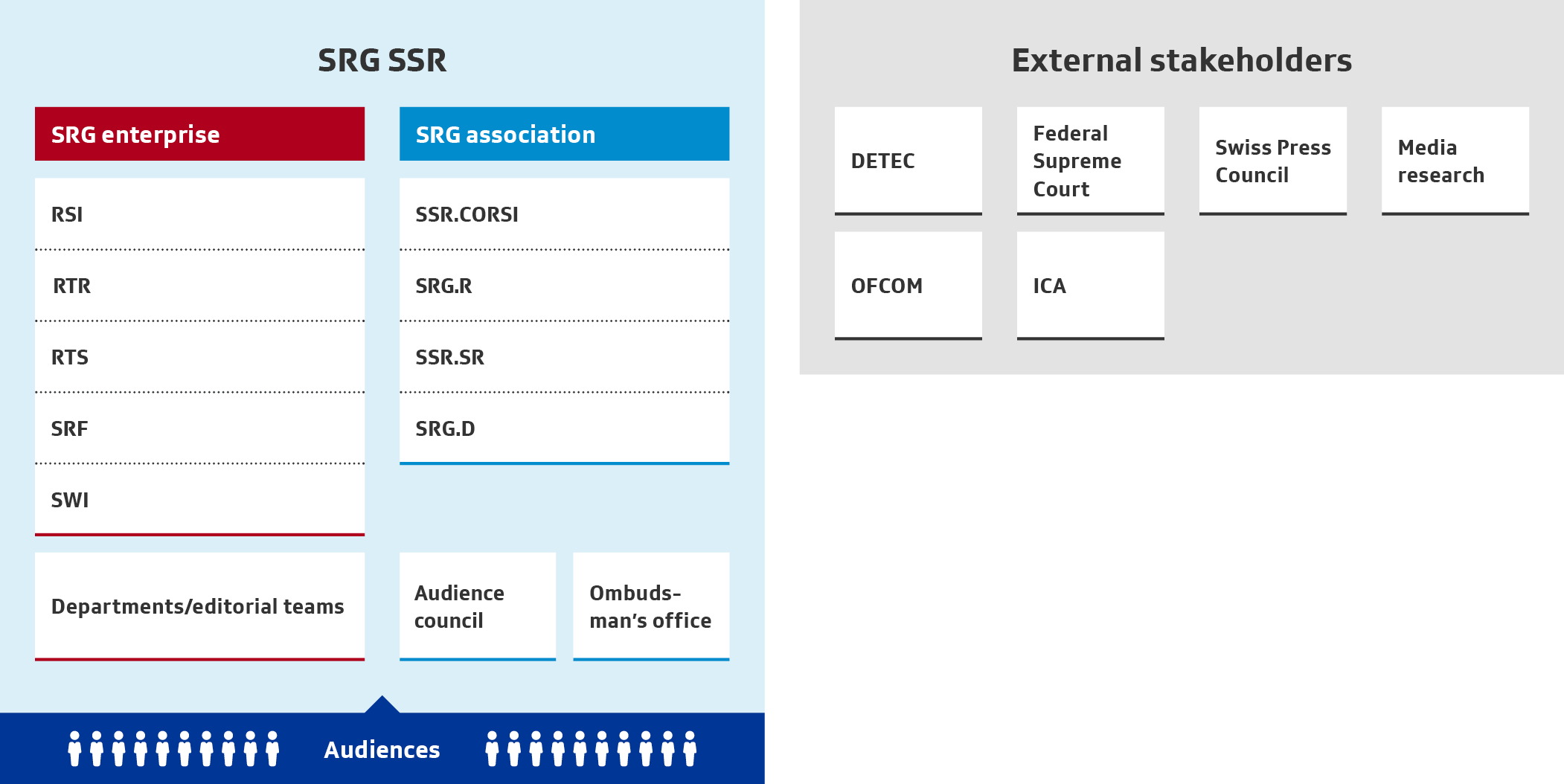Quality for everyone
SRG places great importance on quality. Thanks to our economic and political independence and our high standards, we reach out to 52% of the Swiss population every week on radio and 54% on television. Our output enjoys a high level of credibility (Publikumsbefragung: Programmbewertung elektronische Medien 2024). Quality is a public service.
In our programmes we provide a contrast to the global trend of rapidly disseminated, and often unverified, information and fake news. Our media professionals adhere to the Content and Services Charter in their activities.

What does SRG understand by quality?
The SRG considers quality from three perspectives:
- Its social mandate: How well is SRG fulfilling the terms of its licence? An indication of the answer to this question can be found in SRG’s internal programme statistics, the findings of its Public Councils and the programme analyses carried out on behalf of OFCOM.
- Its internal objectives: How well is SRG meeting its own standards, such as guidelines, training standards, etc? How well are we meeting our strategic corporate objectives and goals? SRG’s internal statistics and reports provide an indication of the answer.
- Its audience: How well do our programmes go down with audiences? Ratings and regular surveys provide an indication of the answer.
The SRG considers quality from three perspectives:
What does the licence require from SRG in terms of journalistic quality?
Article 4 of the SRG licence describes its requirements for journalistic quality:
- SRG’s output must meet high quality and ethical standards.
- The individual programming areas are guided by the programming remit. The remit is also described in the licence.
- The individual programming areas must be characterised by relevance, professionalism, independence, diversity and accessibility. These five criteria form the basis of SRG’s quality-assurance system.
- SRG ensures that its programming is unique, thereby differentiating itself from commercial broadcasters.
- SRG seeks to achieve a high level of acceptance among its various target audiences.
- SRG regularly conducts internal quality inspections.
- SRG regularly has quality inspections carried out by external experts. The annual inspections are conducted in all SRG Enterprise Units. They are conducted by experts with the necessary professional skills and experience.
- SRG informs the public of the results of its quality inspections: SRG reports on its efforts to promote the journalistic quality of its programmes in the SRG Annual Report each year and provides information on its platforms about its quality-assurance system.
Quality as a process
Quality is not a constant state; it has to be worked at day by day. We have developed tools to measure, manage and monitor the quality level of our programmes. Staff suggestions and proposals help us to enhance quality management in practical terms. We engage in a constant process of exchange with our colleagues from abroad and with the research community.

SRG's internal and external supervisory bodies

In order to meet the requirements of the licence, SRG has developed a comprehensive quality assurance system. SRG's enterprise units – RSI, RTR, RTS, SRF and SWI – apply these quality assurance principles and check compliance with them. The quality assurance managers at RSI, RTR, RTS, SRF and SWI also meet regularly as part of the National Specialist Quality Group to share knowledge and experience. The various departments in the enterprise units also check the quality of output within their remit, and the editorial teams conduct quality checks before and after broadcast using specific checking procedures. The enterprise units also get feedback from audiences – for example via customer service or at public events.
On the association side, the audience councils of the regional companies SSR.CORSI, SRG.R, SSR.SR, SRG.D and SWI monitor SRG output on an ongoing basis. As representatives of civil society, the members of the audience councils also receive feedback from audiences and act as a link between the public and SRG. If they have complaints or concerns about programming, audiences can contact the independent ombudsman's office of the relevant regional company or of SWI, which will review the complaint and act as an arbitration body.
External stakeholders
Anyone who doesn't agree with the findings of the ombudsman or would like to obtain a decision, can file a complaint with the Independent Complaints Authority for Radio and Television (ICA). If one of the two parties – person filing the complaint or programme provider – does not agree with the ICA's decision, an appeal can be lodged with the Federal Supreme Court.
As supervisory authority of SRG, the Federal Department of the Environment, Transport, Energy and Communications (DETEC) and the Federal Office of Communications (OFCOM) review compliance with the Radio and Television Act (RTA) and licence.
The licence requires SRG to have regular quality checks carried out by external specialists. SRG complies with this requirement by undergoing external quality audits. The results of the quality audits are published on srgssr.ch.
Media researchers also examine SRG's journalistic output without a legal mandate. For example, the Research Center for the Public Sphere and Society (Fög) at the University of Zurich publishes the annual 'Quality of the Media Yearbook' with the latest key figures on media quality, media use, media concentration, and the development of the Swiss media system.
Another external supervisory body is the Swiss Press Council, which serves as an alternative complaints authority and monitors compliance with the Code of Conduct that applies to all journalists.
Last updated: July 2025
